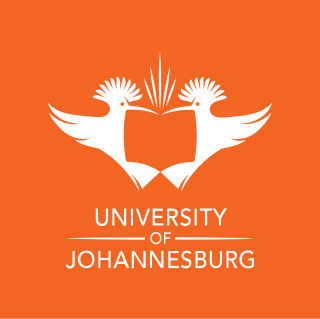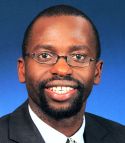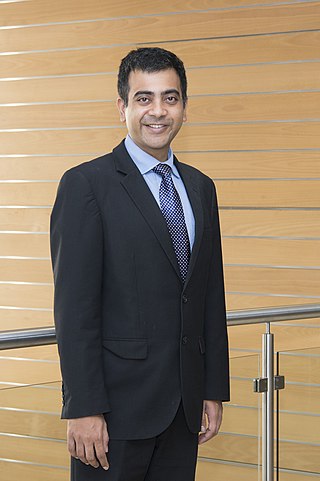Trevor Lloyd Wadley, was a South African electrical engineer, best known for his development of the Wadley Loop circuit for greater stability in communications receivers and the Tellurometer, a land surveying device.

The University of Johannesburg (UJ) is a public university located in Johannesburg, South Africa. The University of Johannesburg came into existence on 1 January 2005 as the result of a merger between the Rand Afrikaans University (RAU), the Technikon Witwatersrand (TWR) and the Soweto and East Rand campuses of Vista University. Prior to the merger, the Daveyton and Soweto campuses of the former Vista University had been incorporated into RAU. As a result of the merger of Rand Afrikaans University (RAU), it is common for alumni to refer to the university as RAU. The vice-chancellor and principal of UJ is Professor Letlhokwa George Mpedi who took office on 1 January 2023. Between 2018 and 2022, UJ's vice-chancellor and principal was Tshilidzi Marwala.

Tshilidzi Marwala is a South African artificial intelligence engineer, a computer scientist, a mechanical engineer and a university administrator. He is currently Rector of the United Nations University and UN Under-Secretary-General. In August 2023 Marwala was appointed to the United Nations scientific advisory council.
Ashraf Johaardien is a multi-award-winning playwright, actor, and producer. He was the recipient of the inaugural PANSA Jury Award (2002), was listed as one of Mail & Guardian's 'Top 200 Young South Africans' (2008) and he received a Legends Award (2012) for his achievements in arts and culture.
Mbilwi Secondary School is a school in the town of Sibasa in Limpopo, South Africa.

Rosina Mamokgethi Phakeng is a South African professor of mathematics education who in 2018 became a vice-chancellor of the University of Cape Town (UCT). She has been the vice principal of research and innovation, at the University of South Africa and acting executive dean of the College of Science, Engineering and Technology at UNISA. In 2018 she was an invited speaker at the International Congresses of Mathematicians. In February 2023 it was announced that she would leave her position as vice-chancellor of UCT and take early retirement. She was succeeded by Professor Daya Reddy on 13 March 2023
Tebogo Ditshego is the chief executive officer (CEO) of South African public relations agency Ditshego Media and President of the Public Relations Institute of Southern Africa (PRISA). Forbes Magazine included him in their list of the top 30 African entrepreneurs under 30 in 2014. In 2012 he founded an on-line book club called ReadaBookSA, which has grown to become the biggest on-line book club in Africa.
The Johannesburg Institute for Advanced Study (JIAS), launched in 2015, is a collaborative initiative involving the University of Johannesburg (UJ) in South Africa and Nanyang Technological University (NTU) in Singapore.
Tebello Nyokong is a South African chemist and distinguished professor at Rhodes University, and a recipient of South Africa's Order of Mapungubwe. Nyokong's work has been published around 450 times including a patent. She was awarded the South African Chemical Institute Gold Medal in 2012, and named one of the Top 10 Most Influential Women in Science and Technology in Africa by IT News Africa. She is currently researching photo-dynamic therapy, an alternative cancer treatment method to chemotherapy. In 2007, she was one of the top three publishing scientists in South Africa, and in 2013 she was awarded the National Research Foundation's Lifetime Achievement Award.

Saurabh Sinha is an influential South African engineer and a Deputy Vice Chancellor for Research and Internationalisation at the University of Johannesburg. He was previously the Executive Dean of the Faculty of Engineering and the Built Environment at the University of Johannesburg. He formerly served as Director of the Carl and Emily Fuchs Institute for Microelectronics at the University of Pretoria, from which he graduated with a Ph.D. in electronic engineering.
Megan Jill Russell is a Biomedical and Electrical engineer based in Johannesburg, South Africa. She is popularly known for inventing an artificial larynx which was featured by MIT Technology Review, but perhaps more importantly, she is involved in the development of methods of Computer-assisted detection of Tuberculosis.

Patience Mthunzi-Kufa is a South African physicist and head of biophotonics research at the Council for Scientific and Industrial Research. She received the Order of Mapungubwe in Bronze.
The National Science and Technology Forum (NSTF) is a non-profit company representing South African organisations in the public and private sector with an interest in science, engineering, technology, and innovation. Its aim is to promote science, engineering, and technology, and to engage with related government policies. Established in 1995, the NSTF organizes annual awards for research and development excellence in South Africa.

Irvy (Igle) Gledhill is a South African physicist at the University of Witwatersrand, School of Mechanical, Industrial & Aeronautical Engineering, in Johannesburg.
Janice Leigh Limson is a South African Professor of Biotechnology, former Chairperson the School of Biotechnology at Rhodes University and the SARChI Chair in Biotechnology Innovation & Engagement at Rhodes University. She is founder and editor-in-chief of the magazine Science in Africa, the first popular online science magazine for Africa. Her research focuses on topics ranging from the development of nanotechnology biosensors for cancer diagnostics, drug delivery, detection of pathogens in food to the design of fuel cell technology.
Alison Lewis is a South African chemical engineer known for her research in crystallisation and precipitation as applied to the recovery of valuable metals. She is Dean of the Faculty of Engineering and the Built Environment at the University of Cape Town (UCT) and is a member of UCT’s Senior Leadership Team. Lewis is also the founder and director of UCT’s Crystallisation and Precipitation Research Unit.
Philiswa Nomngongo is a South African professor of Analytical Chemistry and the South African Research Chair (SARChI) in nanotechnology for water. Her research focuses on environmental analytical chemistry and the use of nanomaterials for water treatment, water remediation, and water quality analysis and monitoring.
Fiona Tregenna is a South African economist who is professor of economics at the University of Johannesburg. She holds the South African Research Chair in industrial development. She has been a member of the South African Competition Tribunal since 2013 and served on President Cyril Ramaphosa's Presidential Economic Advisory Council.
Malik Maaza, also written as Mâaza, is an African physicist and UNESCO Chair in Nanosciences and Nanotechnology. He has made significant contributions to the field of physics, particularly in nanosciences and nanotechnology. Maaza has received several prestigious awards, including the Order of Mapungubwe and the Spirit of Abdus Salam Award, and recognition from the World Cultural Council for his contributions to education and research in physics.






